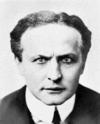- Houdini, Harry
-
died Oct. 31, 1926, Detroit, Mich., U.S.U.S. magician.The son of a rabbi who emigrated from Hungary to the U.S. and settled in Wisconsin, he became a trapeze performer at an early age. In 1882 he moved to New York City, where he played in vaudeville shows without much success. From about 1900 he earned an international reputation for his daring feats of escape from locked boxes, often submerged, while shackled in chains and handcuffed. His success depended on his great strength and agility and his unusual skill in manipulating locks. He exhibited his abilities in several films (1916–23). In his later years he campaigned against magicians and mind readers who claimed supernatural powers, including Jean-Eugène Robert-Houdin, from whom Houdini had taken his name.
 Harry Houdini.Pictorial Parade
Harry Houdini.Pictorial Parade* * *
▪ American magicianoriginal name Erik Weiszborn March 24, 1874, Budapest [see Researcher's Note]died Oct. 31, 1926, Detroit, Mich., U.S.Houdini was the son of a rabbi who emigrated from Hungary to the United States and settled in Appleton, Wis. He became a trapeze performer in circuses at an early age, and, after settling in New York City in 1882, he performed in vaudeville shows there without much success. In 1894 he was married to Wilhelmina Rahner, who thereafter as Beatrice Houdini served as his stage assistant. From about 1900 Houdini began to earn an international reputation for his daring feats of extrication from shackles, ropes, and handcuffs and from various locked containers ranging from milk cans to coffins to prison cells. In a typical act he was shackled with chains and placed in a box that was locked, roped, and weighted. The box was submerged from a boat, to which he returned after freeing himself underwater. In another outdoor exhibition he allowed himself to be suspended, head down, about 75 feet (23 m) above ground and then freed himself from a straitjacket. These demonstrations were typically watched by many thousands of people. Houdini's uncanny escape abilities depended partly on his great physical strength and agility and partly on his extraordinary skill at manipulating locks. He exhibited his skills in many motion pictures from 1916 to 1923.In his later years Houdini campaigned against mind readers, mediums, and others who claimed supernatural powers. He argued that they were charlatans who produced all of their effects through natural means and various tricks. He wrote Miracle Mongers and Their Methods (1920) and A Magician Among the Spirits (1924). Houdini and his wife, however, agreed to conduct an experiment in spiritualism: the first to die was to try to communicate with the survivor. His widow declared the experiment a failure before her death in 1943.Houdini took his stage name from the name of the French magician Jean-Eugène Robert-Houdin (Robert-Houdin, Jean-Eugène), but he later wrote The Unmasking of Robert-Houdin (1908), a debunking study of Houdin's abilities. Houdini wrote the article on conjuring for the 13th edition of the Encyclopædia Britannica (1926). He died of peritonitis that stemmed from a stomach injury.* * *
Universalium. 2010.
